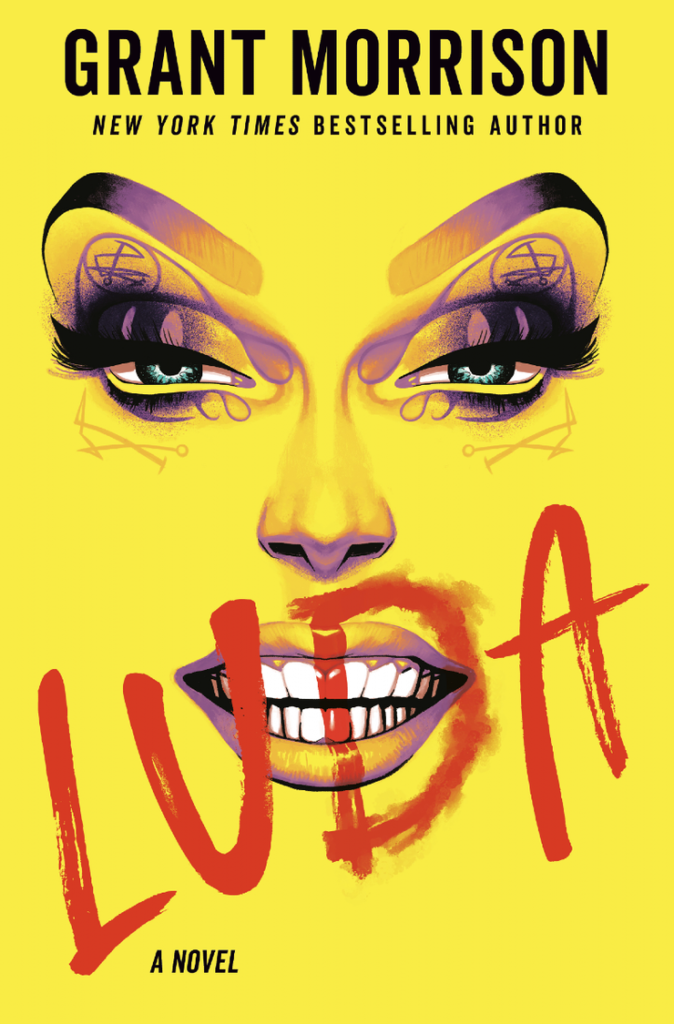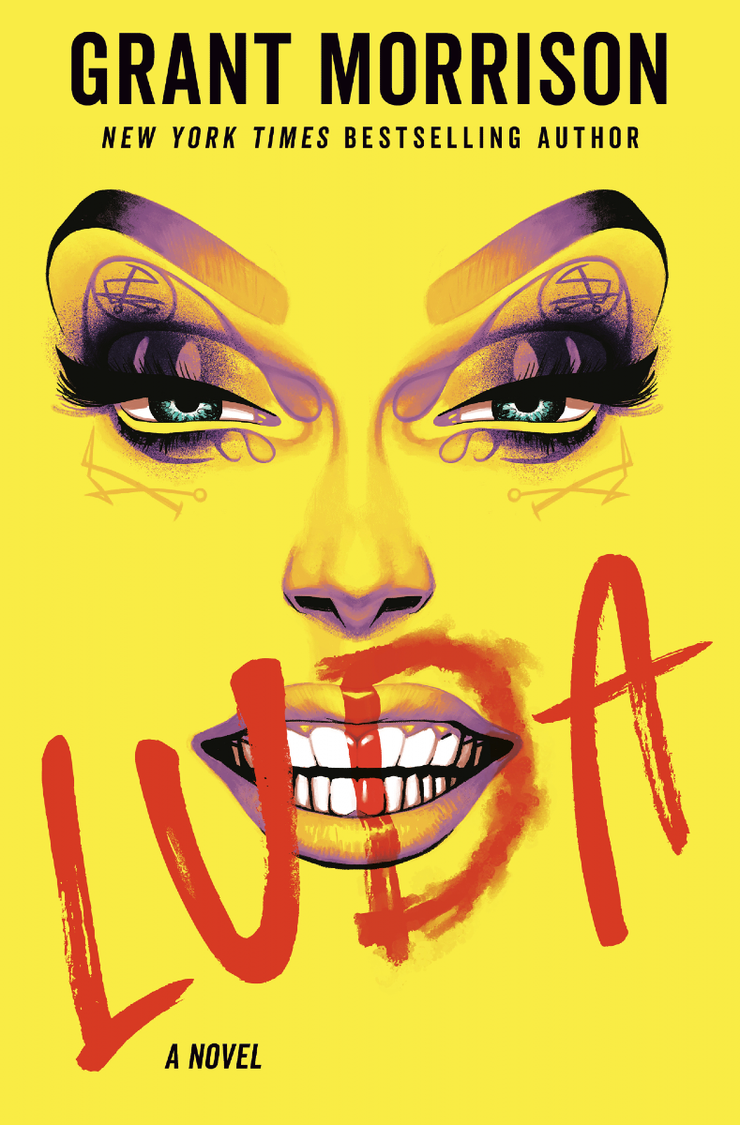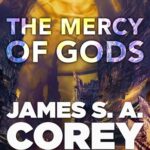
Genres: Fantasy, Contemporary or Urban Fantasy
Representation: Queer MCs
PoV: First-person, past-tense
Published on: 6th September 2022
ISBN: B09W8RLC8H
Goodreads

Luci LaBang is a star: for decades this flamboyant drag artist has cast a spell over screen and stage. Now she’s the leading lady in a smash hit musical. But as time takes its toll, Luci fears her star is beginning to dim.
When Luci’s co-star meets with a mysterious accident, a new ingenue shimmers onto the scene: Luda, whose fantastical beauty and sinister charm infatuate Luci immediately... and who bears a striking resemblance to herself at a much younger age.
Luda begs Luci to share the secrets of her stardom, and reveal the hidden tricks of her trade. For Luci LaBang is a mistress of the The Glamour, a mysterious discipline that draws on sex, drugs, and the occult for its trancelike transformative effects.
But as Luci tutors her young protegee in the art, their fellow actors and crew members begin meeting with untimely ends. Now Luci wonders if Luda has mastered The Glamour all too well... and exploited it to achieve her dark ambitions.
What follows is an intoxicating descent into the demimonde of Gasglow, a fantastical city of dreams, and into the nightmarish heart of Luda herself: a femme fatale, a phenomenon, a monster, and perhaps, the brightest star of them all.
I received this book for free from the publisher via NetGalley in exchange for an honest review. This does not affect my opinion of the book or the content of my review.
Highlights
~drag is magic
~beware ingénues
~all hail the manny-queen
~trust nothing
~enjoy everything
A Note
Here’s the thing: I fucking loved Luda…right up until the last few pages, where there suddenly is, for no fucking reason whatsoever, a flashback to a pretty graphic, very tragic animal death.
It hit me like a punch to the face, and retroactively ruined the book for me.
Until that, it was one of my favorites of the year. I was enjoying it so much, even if I wrinkled my nose occasionally at some of the cruder bits. So that one scene – gods. I wish Morrison just fucking hadn’t. It wasn’t even vaguely necessary. It came out of nowhere. And so unexpected like that, so close to the end? It felt weirdIy like some horrible betrayal.
Now: I’m going to do my best, from here on, to pretend that scene never fucking happened, and try to remember how I felt about the book before that scene, and review it thusly. But that scene is there, and if that’s something you need to know about, well, consider yourself warned.
A Review
In which we pretend That Scene never happened
Luda is a shameless, phantasmagorical, hallucinogenic whirlwind of glitter and sequins, sex and theatre, drugs and maybe-magic. It’s clever, twisty, fucked-up, and mercilessly human – even as it’s simultaneously over-the-top, beyond belief, and gloriously flamboyant. It serves up equal servings of LSD, kink, shade, and glamour-queen realness.
It is so much fun.
feather boas slung like trophies, pelts of feral plushies I’d hunted and skinned through neon-pink-and-blue jungles
I’ll admit, it took me a moment to adjust – the beginning, the opening chapter, was confusing at first, and then briefly a little boring, as Luci gives us a pretty quick rundown of wtf panto is – which is fair, because it’s a pretty uniquely British thing, so a lot of readers might need that explanation.
Regardless, stick with it, because after that first chapter, Luda is nothing short of stunning.
I took a step back, shot through the soul with a yearning arrow, curare-tipped and fletched with hummingbird feathers.
The set-up goes something like this: Luci LaBang was once very famous indeed, then dropped off the map, and now is satisfyingly well-known again as the star of a groundbreaking panto/musical. She’s telling her story to the reader – the fourth wall was knocked out to make room for Luci’s ego, and perhaps her dresses – and not in the most linear fashion. She rambles, she muses, she wanders down side-tracks, she slyly reminds the reader over and over not to trust her account of events too much. And I guess it could be annoying for some readers, but honestly, I loved it. I loved the messiness of it, the untidiness, because it felt like an organic messiness. This is how real people talk – not always in a straight line, occasionally forgetting details, becoming distracted by other things, their mind making leaps of connection that might not make much sense from the outside.
I think the majority of story-tellers – at least the ones telling stories in English, I can’t speak for other literary traditions – are taught that their stories must be…must be neat. The story must go from point A to point B to point C with no deviations. Think of Chekhov’s Gun: no detail must be present that is not directly relevant to the story. I mean, think of the first-person stories you’ve read, and compare those narrators to yourself. Are your thoughts ever that tidy? That focussed? That narratively-relevant? Because mine definitely aren’t.
In spooky stories, they never do the sensible thing. A glimpse of the Underworld’s too much of a temptation.
Luda tosses out those conventions and sprawls in glittery glory across every page. Don’t get me wrong: Luci loves the sound of her own voice, and between that and how purple and ornate her voice actually is, I strongly suspect this is going to be a love it or hate it book, with very few readers falling in the middle. But I do think everything about Luda is designed to incite a passionate response; either you’ll love it passionately, or hate it with the power of a thousand burning suns. I can’t see any room for a middle ground.
Anyway.
The actual story Luci is telling is how the eponymous Luda came into her life and what ensued therein, and that’s about all I can say without spoilers. It’s also hard to know how to refer to Luci or Luda; Luci is AMAB but goes by the name Luci full-time, and rejects any label but queer (which is something I massively appreciate); Luda, on the other hand, has such an (allegedly) fucked-up backstory and relationship to gender that it’s hard to know if she’d identify as trans or something else. It’s probably simplest to just call her queer as well. Again we have that sense of organic messiness, the reminder that real people often don’t fit neatly into one box.
I’m fine with making up my face; making my mind up is beyond my capabilities. … I was queer. I was a living mess of contradictions. I felt like an alien peeking through circular spaceship windows at the world and its folly. That was the best I could come up with.
Luci spins us a tale that is fantastical and sordid, outrageous and mundane, convoluted and very simple. It’s not easy to classify as a single thing – it’s not quite fantasy, not quite horror, but too much of both to be contemporary fiction. There’s spikes of sharp humour, moments of cringe or crudeness (or both), philosophical musings and occult ramblings. It’s plenty fucked-up; Luci and the reader gradually become more and more convinced that Luda is Up To No Good, taking down her competition one by one – and unfortunately, she might well see Luci as a competitor too.
But maybe this is excused – or at least explained? – by the screwed-up backstory I alluded to? I think this is the one weakness of the book, actually, because we’re effectively lectured about this backstory; we don’t see it, we’re told it, and hard as Morrison works to make us gag on the awfulness of it, it’s so over the top that it’s unbelievable.
Then again, it’s not at all clear that we’re meant to believe it, or even take it seriously. Not only is Luci herself an unreliable narrator, the circumstances in which Luda’s backstory is revealed are…not conducive to trustworthy testimony, let’s say.
I’m sorry I can’t be one more identical wedge in your clockwork chocolate orange!
The only other possible critique I might have is that I’m not sure how clear the workings of the Glamour are to anyone who doesn’t have some familiarity with modern witchcraft. I do, so I got it (and absolutely adored the delicious, ridiculous, completely believable mix of chaos magic and drag and ceremony that Luci/Morrison’s put together) but is a Christian reader, for example, going to recognise what Drawing Down [insert deity of your choice here] is? I feel like some readers might need a quick overview of practical Wicca or something first. Then again, maybe magic just reads as even more mysterious and occultic without that understanding.
It doesn’t really matter – none of the (imo, very minor) flaws matter, the story hardly matters, because what you’re really here for is Luci, whose telling of the story is even more interesting than the story itself (which is saying a lot, when we’re talking backstabbing, kink parties, magic both dark and glittery, kidnapping and psychological torture, and a very unique take on a pantomime production of Aladdin). It doesn’t matter how unreliable a narrator Luci is, whether or not literally anything went down the way she tells it, because the way she tells it is just so much fun. I would happily listen to Luci talk about just about anything, and the fact that she knows it bothers me not at all.
Luda releases in the US today. Don’t miss it!







Leave a Reply